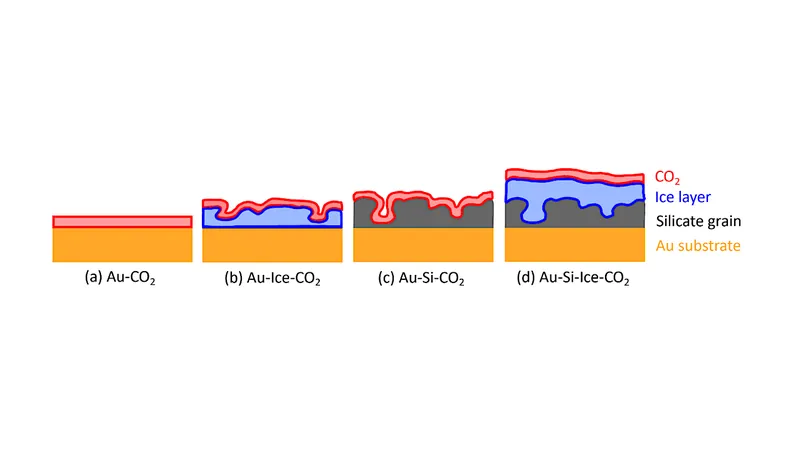
Shocking Discovery: How Cigarette Smoke Destroys Your Immune Defense and Boosts Lung Diseases!
2025-01-17
Author: Yu
Introduction
Cigarette smoking is a global epidemic that poses a severe threat to public health, leading to a range of diseases, particularly respiratory illnesses. Recent groundbreaking research from a team at Monash University’s Biomedicine Discovery Institute has unraveled the dark ways in which the components of cigarette smoke, including those from e-cigarettes, sabotage the function of critical immune cells in our lungs. The implications of these findings could be life-changing for smokers and those exposed to second and third-hand smoke.
Research Findings
Published in the esteemed Journal of Experimental Medicine, the study led by researchers like Dr. Wael Awad uncovered how cigarette smoke alters the behavior of mucosal-associated invariant T (MAIT) cells, which play a pivotal role in defending against bacterial and viral infections. Unfortunately, these alterations jeopardize smokers' immune systems, leaving them defenseless against respiratory infections and intensifying the severity of smoking-related conditions like chronic obstructive pulmonary disease (COPD), the third leading cause of chronic morbidity and death globally, according to the World Health Organization.
Risks of COPD
COPD patients are already at a heightened risk for influenza infections, which can devastate their health by igniting inflammation and damaging vital lung structures known as air sacs. Yet, despite the overwhelming evidence of the dangers associated with cigarette smoking, there remain no effective treatments for COPD, largely because the underlying mechanisms that lead to inflammation and disease progression remain poorly understood.
Impact on MAIT Cells
The research highlights a concerning trend: cigarette smoke significantly reduces the number and effectiveness of MAIT cells, which ideally would populate the lungs and assist in fighting off infections. The study's findings suggest that more than 20,000 chemicals in cigarette smoke might influence MAIT cell behavior by binding to MR1, a protein crucial for activating these immune defenders. However, the specific relationships between these chemicals, MR1, and the ramifications for lung health remain to be fully elucidated.
Deeper Analysis
Dr. Jamie Rossjohn, a co-leader of the study, stated that while smoke from various sources—cigarettes, bushfires, vehicle exhaust, and more—poses serious health risks, the detailed effects of specific smoke components on our immune system are still shrouded in mystery. This gap in knowledge has left healthcare professionals in a bind, struggling to develop effective treatments for lung disease stemming from smoking.
Methodology and Findings
To bolster their findings, the researchers employed computer modeling to identify which cigarette smoke components could potentially bind to MR1. They discovered that certain chemicals, like benzaldehyde derivatives (commonly used as flavoring agents in cigarettes and e-cigarettes), may inhibit the activation of MAIT cells while simultaneously altering their presence on cell surfaces.
In animal studies, they observed that mice repeatedly exposed to cigarette smoke exhibited deterioration of lung health, exacerbated when infected by the influenza virus. Notably, the absence of MAIT cells provided some protection against the harmful effects of cigarette smoke, resulting in lower lung inflammation and better tissue preservation. This suggests that protecting MAIT cell function could be a viable target for future therapies.
Conclusion
The ultimate conclusion drawn from this research paints a grim picture: components of cigarette smoke bind to MR1, impairing MAIT cell functionality and, in turn, making individuals more vulnerable to infections and accelerating the progression of lung disease. The researchers are now gearing up to delve deeper into how precisely cigarette smoke wields its destructive influence on MAIT cells, aiming to unearth new therapeutic avenues for combating COPD and similar respiratory ailments.
Call to Action
This study not only shines a light on the insidious methods by which cigarette smoke undermines our immune defenses but also underscores the necessity of multidisciplinary approaches in scientific research. As Dr. Alexandra Corbett stated, collaborative efforts are essential to unraveling complex health issues posed by smoking and improving treatment outcomes. As the world grapples with the fallout of smoking, this research serves as a critical reminder of the profound effects that lifestyle choices can have on our health. Are you still hesitant to quit? The evidence is clearer than ever—it's time to rethink smoking for good!




 Brasil (PT)
Brasil (PT)
 Canada (EN)
Canada (EN)
 Chile (ES)
Chile (ES)
 Česko (CS)
Česko (CS)
 대한민국 (KO)
대한민국 (KO)
 España (ES)
España (ES)
 France (FR)
France (FR)
 Hong Kong (EN)
Hong Kong (EN)
 Italia (IT)
Italia (IT)
 日本 (JA)
日本 (JA)
 Magyarország (HU)
Magyarország (HU)
 Norge (NO)
Norge (NO)
 Polska (PL)
Polska (PL)
 Schweiz (DE)
Schweiz (DE)
 Singapore (EN)
Singapore (EN)
 Sverige (SV)
Sverige (SV)
 Suomi (FI)
Suomi (FI)
 Türkiye (TR)
Türkiye (TR)
 الإمارات العربية المتحدة (AR)
الإمارات العربية المتحدة (AR)